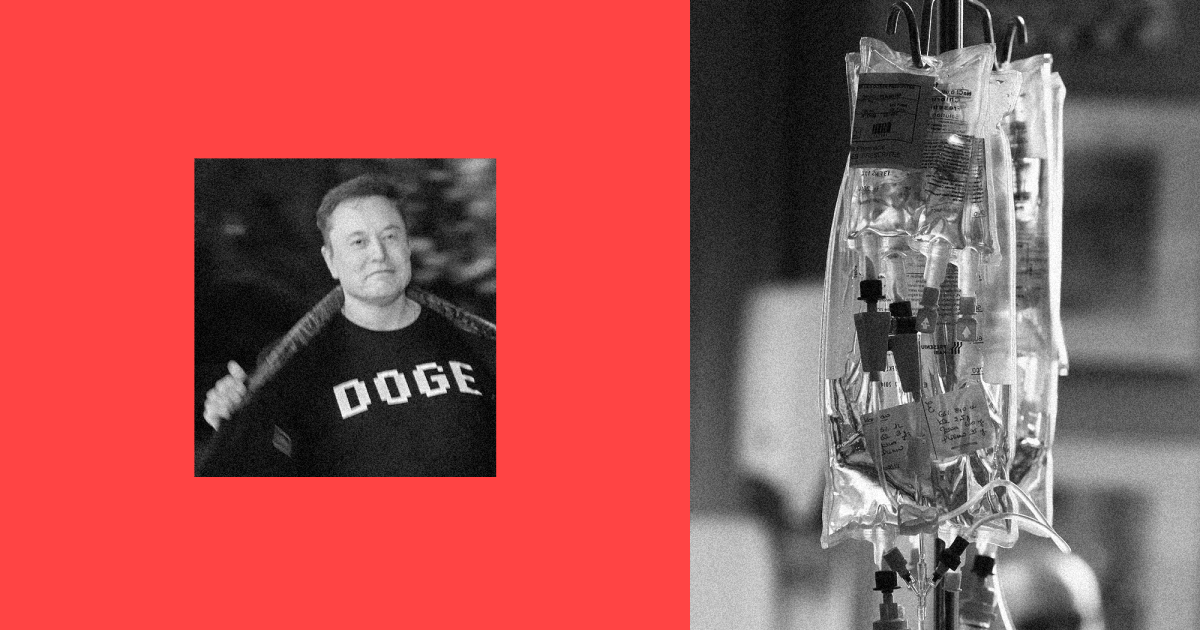In February, after Donald Trump returned to office, Army veteran Mark Puhl’s medical requests to the Department of Veterans Affairs—for surgery and a chemotherapy port, both related to cancer for which he had already received care through the VA—were denied. Puhl, who lives in Phoenix, Arizona, holds the cost-cutting efforts of Elon Musk’s “Department of Government Efficiency” responsible.
“They approved me to see the surgeon who would do the surgery,” Puhl, 37, said. “They approved an MRI on top of that, to make sure that there were no vessels wrapped around the lumps they wanted to cut out to test for cancer. But then they denied the surgery itself.”
Puhl, who served Army tours in both Afghanistan and Iraq, was diagnosed with T-cell lymphoblastic lymphoma, a rare type of cancer, in 2022. Puhl was exposed to burn pits—open-air incineration of trash, often toxic, by militaries in the field—and said that a VA doctor had previously connected his case of lymphoma to his service. Due to the complexity of treatment for his cancer, Puhl was referred to the VA’s Community Care program, through which the agency would pay for his care at an outside hospital. Every day, Puhl takes oral chemotherapy pills; once a month, he takes steroid medication, both of which the VA provides. But even before the Trump presidency, his coverage was not exactly perfect.
“Even under the Biden administration, there were issues with me just getting assistive devices,” Puhl said. “The [VA] didn’t want to get anything done in a timely manner. It took them over a month for that one.”
It was already challenging to get into Community Care. Another veteran I spoke with, Ed Anderson, an organizer with Common Defense, told me that he was rejected by the program last year when he reached out for help with gastrointestinal disorders. Anderson previously received mental health support through Community Care, which he described as “life-saving.”
In February, it was announced that Veterans Affairs would be subjected to billions of dollars worth of contract cuts. It emerged later that month, following backlash, that the contracts themselves would not be slashed—but the recent crop of unexpected denials like Puhl’s reflect veterans’ concern that workers in the VA, whose budgets and jobs face the sweeping threats of DOGE, may feel pressured to take steps to save money, even in areas they haven’t yet been explicitly directed to. In a statement to Mother Jones, VA press secretary Pete Kasperowicz said that “VA DOGE liaisons are not involved in Veterans’ health care decisions, and VA has made no efforts to scale back community care.”
Puhl said that VA staff who rejected his Community Care coverage told him they were just following agency policy—and that the care they had previously approved for him already “cost the taxpayers money.” To Puhl, that doesn’t add up: the surgeon he had been approved to see at an outside hospital was also already going to cost money through the Community Care program.
The rates, Puhl replied, were the problem—not the vets. “If you’re complaining about keeping your job and having money saved, [it’s] $50,000 for 30 minutes to talk to an oncologist,” Puhl said. He then asked why he hadn’t been approved for a new chemotherapy port, which he needed in order to receive inpatient chemotherapy treatment twice a year. The person he spoke with said they weren’t in charge of that denial.
A notice Puhl later received, reviewed by Mother Jones, said that a VA surgeon could perform his cancer-related surgery—but the agency had previously referred him to Community Care because it believed that wasn’t the case. It made no sense to him.
“If you want to sit there and worry about your job and affect other people’s lives,” Puhl said, “that’s not going to work.”
Those delays in care have made Puhl sicker in recent months. It’s not easy to keep up with work—which includes running his own animal rescue service, having a dog training business, and a job at a friend’s mechanic shop—while being in a lot of pain. Dealing with delays to cancer treatment is an extra job that he does not need.
Given the longstanding veterans’ mental health crisis, Puhl is also extremely concerned about the psychological impact of further roadblocks for veterans trying to get the care they need.
“What do you think is going to happen next?” Puhl asked, rhetorically.
From Mother Jones via this RSS feed


